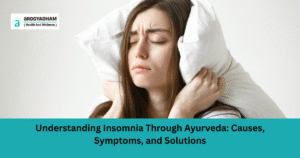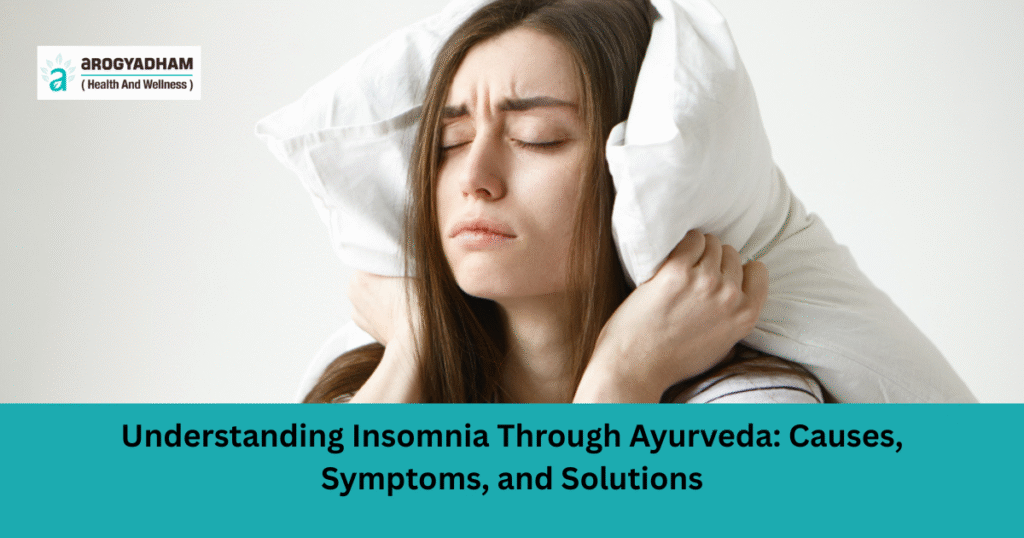Understanding Insomnia Through Ayurveda: Causes, Symptoms, and Solutions
- Home
- /
- Ayurvedic Medicines
- /
- Understanding Insomnia Through Ayurveda:...
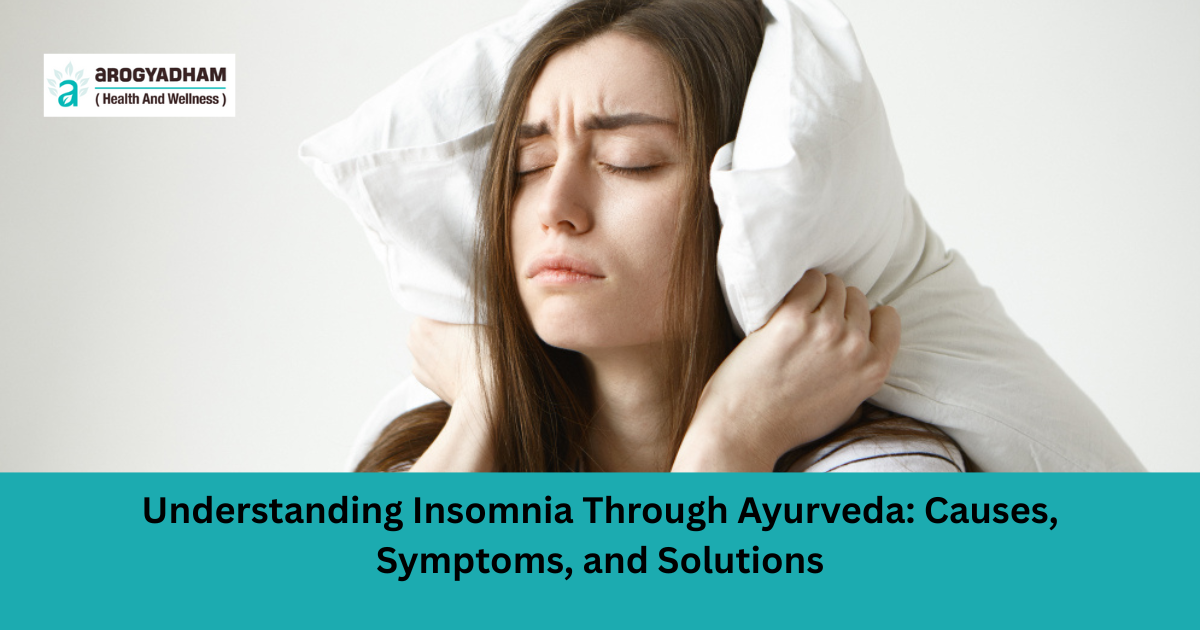
Lie in bed and wait for hours to fall asleep. It’s not just your problem; almost a third of adults report insomnia worldwide, as per the report published in the Journal of Family Medicine and Primary Care in 2016.
In this digital age, we are surrounded by a vast amount of information and content, creating a desire to consume it all so we don’t feel left behind or the fear of missing out (FOMO). Today’s fast-paced lifestyle has made our lives more stressful, and the constant urge we have to obtain things quickly is a primary contributor to sleep disorders.
Individuals have different sleep habits and needs. Some are night owls, and some are early risers. They naturally prefer to go to bed early or late, whereas some people are short sleepers, who naturally require less sleep. Researchers believe that there may be a genetic basis for this preference.
What is Insomnia?
Insomnia is a condition where a person is unable to get quality sleep, struggles to fall asleep or stay asleep, which makes them feel exhausted throughout the day and minimizes their focus, affecting their overall functionality.
Women are more at risk of having Insomnia, especially older women, than men. It is mainly because of hormonal changes, and most women face it during menopause.
Many college students and adults face this problem today due to excessive screen time in an age of information overload.
It’s not estimated by the number of hours you sleep but rather defined by the quality of your sleep. If you don’t feel fresh and refreshed, you lack energy and feel drowsy even after sleeping for 8 hours, you might be experiencing insomnia.
It is a common sleeping disorder that can be effectively treated with medications and mental health exercises, and it is generally not dangerous.

Causes of Insomnia
Both psychological and physical factors can cause insomnia.
- Electronic Device: Excessive screen time, especially before bedtime, can disrupt the brain’s production of melatonin, a hormone that signals to the brain it is time to sleep.
- Hormonal Factors: Women are more prone to sleeping disorders due to social and biological reasons. The oestrogen hormone shifts during menstruation, especially when in the stage of menopause or premenopause, which contributes to the issue.
- Caffeine, Nicotine, and Alcohol: These stimulants interrupt sleep, especially if taken in the evening or late afternoon.
- Psychological Issues: Such as depression and other neurological complications.
- Disruption in Circadian Rhythm: It is also known as the internal clock, which can be disrupted by a dynamic work schedule.
- Mental Health Disorders: Such as anxiety and post-traumatic stress disorders, also sleep disorders contribute to the problem, such as sleep apnoea, where respiration pauses during sleep and gasps for breath, and other disorders like moving leg syndrome, where a person tends to move their legs while falling asleep.
- Physical Health and Medical Conditions: Physical health problems can disrupt sleep, including chronic pain, diseases such as stroke, and conditions like acid reflux disease.
- Other Factors: Stress, pregnancy, overeating late at night, and some medications, such as antidepressants, can interfere with sleep.
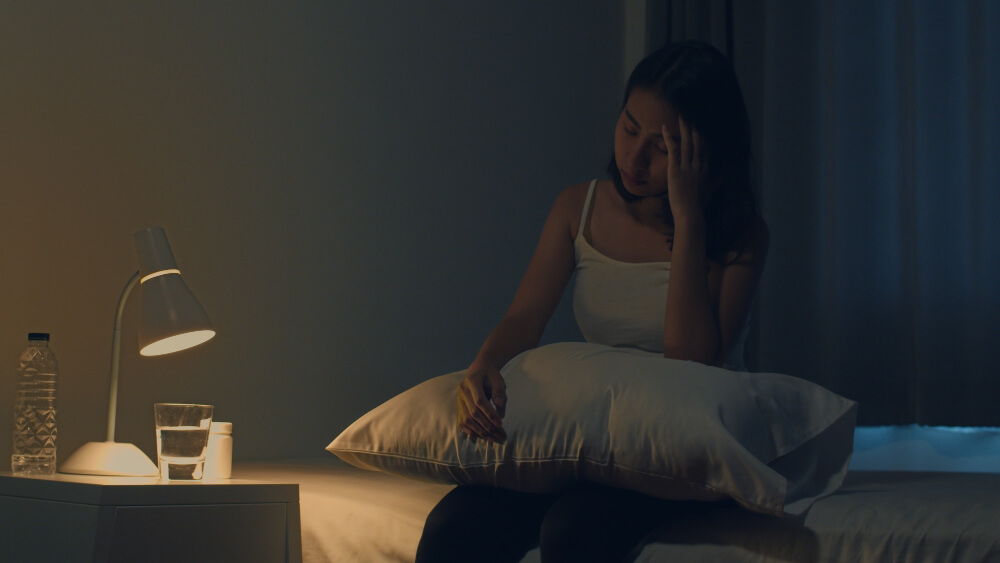
Insomnia Can Be Classified Based On Its Cause and Duration:
Cause: Primary Insomnia occurs on its own; there are no other factors behind it, and Secondary Insomnia is caused by different factors such as high levels of stress hormones in an individual, depression, stroke, side effects of any medication, or other medical conditions.
Duration:
- Transient Insomnia lasts less than 1 week, and one may face issues due to changes in the sleep environment, such as sleep timings, and any stress or tension.
- Acute or Short-Term Insomnia is a condition in which you have problems falling or staying asleep and getting quality sleep consistently for less than a month.
- Chronic Insomnia lasts for longer than a month and can be either primary or secondary.
What Complications Can Sleeping Disorders Add to Your Overall Health and Well-Being?
- Lower Performance
- Curb the pace of your reaction time
- Increase the chance of depression
- Poor immune system function
- Overweight obesity
- Risk of Cardiovascular Diseases
- High Blood pressure
Common Symptoms of Insomnia
Insomnia has several underlying symptoms, such as:
- Finding it difficult to sleep at night
- Can’t fall asleep again after waking up at night
- Awaken too early in the morning.
- Do not feel refreshed after waking up and experience drowsiness, fatigue, tiredness, or sleepiness throughout the day.
- Constant irritation and your body showing signs of depression and anxiety, worsening concentration, and not being able to pay attention, and memory shrinking.
- Relying on sleeping pills or alcohol to fall asleep.
- Having worries related to sleep.
- Emotional instability, fragile temperament, increasing frustration.
Also Read: Best Ayurvedic Treatment For Depression
Insomnia (Anidra Dosha) In The Context of Ayurveda
In Ayurveda, Nidra is one of the three pillars, along with Ahara (diet) and Brahmacharya. Proper sleep is essential for dhatu (tissue) nourishment (ojas), memory, immunity, and emotional stability.
According to Ayurveda, sleep disorders, or Anidra Dosha, are primarily linked with the Vata, Pitta, and Kapha doshas, whose energies are responsible for governing our bodily functions. Especially imbalances in Vata and Pitta doshas are responsible for sleep disorders.
Vata is associated with air and movement, and an air imbalance in it can lead to anxiety, overactivity of the brain, and rumination (repeating thoughts). Pitta dosha is associated with fire and energy imbalance, and an imbalance in this energy can lead to feelings of heat and restlessness at night. Kapha is related to calmness and stability. It promotes quality sleep.
Ayurvedic Solutions for Insomnia
1. Lifestyle & Daily Routine (Dinacharya)
A little tweak to your daily routine can help you overcome the issue.
- Keep your bedroom dark, quiet, and free from electronic devices.
- Try to avoid consuming these stimulants at night, such as tea, coffee, and foods that are fried or spicy.
- Fixed sleep-wake schedule in your daily routine (Dincharya).
- Get used to reading, meditation, or light stretching.
- Relaxing in a hot bath before bed.
- Avoid daytime naps
- Try some yoga or meditation right before bedtime.
2. Ayurvedic Therapies
There are various therapies suggested in Ayurveda to cure Insomnia.
- Aromatherapy: Adding relaxing essential oils, such as chamomile or lavender, to your warm bathwater helps you relax and sleep better.
- Abhyanga (oil massage): This involves a warm oil massage with Brahmi or sesame oil before bedtime, which relaxes the nervous system and eases tense muscles, thereby preparing the body for sleep.
- Shirodhara: In this treatment, medicated oils such as Ksirabala oil and Brahmi oil are poured rhythmically onto the forehead. It facilitates restful sleep by relaxing the nervous system.
- Nasya Therapy Involves applying medicated oils, such as brahmi and anu tel, to clear the nasal passages. It balances the vata and pitta doshas, reduces headaches, and clears up brain fog.
- Basti – The process involves the removal of body toxins through the use of sesame and calamus oil, along with a few alternating herbal decoctions, a similar process to an enema. It is highly effective in managing and fixing vata disorders.
3. Dietary Recommendations (Ahara) in Ayurveda
Things you should include in your diet to promote deep and restful sleep:
- Warm milk, nutmeg, or poppy seeds (khas-khas).
- Drink herbal tea before bedtime, as it helps relax the nervous system and promotes restful sleep. Prepare the tea from chamomile, lavender, and passion flowers, which have certain medical benefits and calming properties.
4. Herbal Remedies (Dravyaguna)
- Ashwagandha: Calms the nervous system.
- Brahmi: Supports mental relaxation.
- Jatamansi: Aids in deep sleep.
- Tagar (Valeriana wallichii): Natural sedative.
- Somlata Vacha Clears toxins from your mind and helps reduce fogginess, anxiousness, and overstimulation.
- Sankhapushpi Helps in reducing stress and promotes emotional stability.
5. Mind-Body Practices & Yoga
Yoga poses help lower stress, reduce muscle tension, and balance the body’s energy, allowing it to function properly. In Ayurveda, various mind-body practices are recommended to restore your circadian rhythm, also known as the body’s internal clock.
- Gentle evening yoga (forward bends, restorative poses).
- Pranayama techniques (Anulom Vilom, Bhramari).
- Meditation or chanting before bed.
- Viprit kriya (alternate nostril breathing)
- Breath of Fire Pranayama
- Meditation, nadi shodhana, brahmarishi, yoga nidra before sleep
- Yoga – Viparita Karani, bala asana, Corpse pose (Shavasana) – calms the nervous system.
Note: Practise these things under the supervision of an expert.
These treatments focus on a balanced diet, calming lifestyle practices, oil therapies, and herbs that restore balance, nourish the mind, and promote natural sleep.
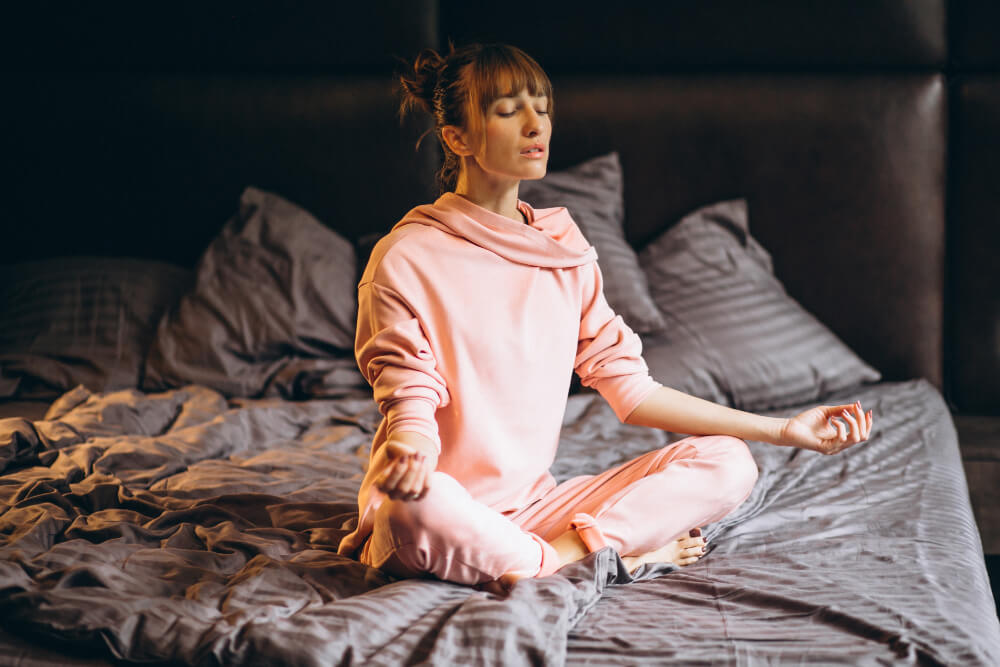
When To Seek Professional Help
- When you find difficulty sleeping for more than a week.
- If you feel exhausted the whole day, and it is affecting your overall functionality and productivity.
- If you are over-relying on sleep aids like any medication or alcohol, and such things.
- Not getting quality sleep for a long time can lead to depression, anxiety, irritability, and mood swings and can have adverse effects on your emotional well-being. In such a condition, a doctor’s consultation is immediately needed.
Chronic Insomnia or sleep disorders may affect your physical Health, which could lead to the following:
- High blood pressure
- Diabetes
- Obesity
- Heart disease, and
- Weakened immune function
Conclusion
Ayurveda is a comprehensive healing system that helps balance the body’s energy, reduce stress and anxiety, and normalise hormonal levels, while enhancing digestion and altering behaviours that can drive sleep disorders. Additionally, it helps with herbal remedies and dietary recommendations to restore a regular sleep schedule in a short time.
If your loved ones or acquaintances are struggling with health issues, our expert medical team at Arogyadham Health & Wellness is here to help. We aim to promote a healthier society and ensure your well-being.
Ready to Heal Naturally?

Share With
Friends

Dr. Rakesh Agarwal, a third-generation Ayurveda expert and research scholar, treats chronic ailments through Ayurveda and Panchakarma. He is also the founder-editor of Arogyadham Magazine, promoting Ayurveda and wellness to over a million readers since 1992.

Dr. Arjun Raj, an Ayurvedic physician and wellness expert, is the Director of Arogyadham Health Care and serves on the executive board of Arogyadham Health and Wellness. He blends traditional Ayurveda with modern wellness to promote balanced, healthy living.

Dr. Amrit Raj, an Ayurvedic doctor and certified yoga teacher, is the Director of Arogyadham Health and Wellness. He specializes in chronic conditions and actively promotes Ayurveda and yoga worldwide for healthier living.



